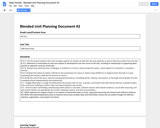
This unit walks students through a variety of activities revolving around George Orwell's book '1984'.
- Subject:
- English Language Arts
- Material Type:
- Unit of Study
- Provider:
- Michigan Virtual
- Author:
- Abby Perdok
- Date Added:
- 06/28/2017

This unit walks students through a variety of activities revolving around George Orwell's book '1984'.
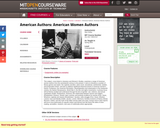
Examines in detail the works of several American authors. Through close readings of poetry, novels, or plays, subject addresses such issues as literary influence, cultural diversity, and the writer's career. Topic: American Women Authors. This subject, crosslisted in Literature and Women's Studies, examines a range of American women authors from the seventeenth century to the present. It aims to introduce a number of literary genres and styles- the captivity narrative, slave novel, sensational, sentimental, realistic, and postmodern fiction- and also to address significant historical events in American women's history: Puritanism, the American Revolution, industrialization and urbanization in the nineteenth century, the Harlem Renaissance, World War II, the 60s civil rights movements. A primary focus will be themes studied and understood through the lens of gender: war, violence, and sexual exploitation (Keller, Rowlandson, Rowson); the relationship between women and religion (Rowlandson, Rowson, Stowe); labor, poverty, and working conditions for women (Fern, Davis, Wharton); captivity and slavery (Rowlandson, Jacobs); class struggle (Fern, Davis, Wharton, Larsen); race and identity (Keller, Jacobs, Larsen, Morrison); feminist revisions of history (Stowe, Morrison, Keller); and the myth of the fallen woman (take your pick). Essays and inclass reports will focus more particularly on specific writers and themes and will stress the skills of close reading, annotation, research, and uses of multimedia where appropriate. A classroom electronic archive has been developed for this course and will be available as a resource for images and other media materials.
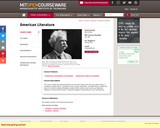
This course studies the national literature of the United States since the early 19th century. It considers a range of texts - including, novels, essays, and poetry - and their efforts to define the notion of American identity. Readings usually include works by such authors as Nathaniel Hawthorne, Henry David Thoreau, Frederick Douglass, Emily Dickinson, and Toni Morrison.
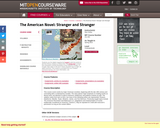
This course covers works by major American novelists, beginning with the late 18th century and concluding with a contemporary novelist. The class places major emphasis on reading novels as literary texts, but attention is paid to historical, intellectual, and political contexts as well. The syllabus varies from term to term, but many of the following writers are represented: Rowson, Hawthorne, Melville, Twain, Wharton, James, and Toni Morrison. Previously taught topics include The American Revolution and Makeovers (i.e. adaptations and reinterpretation of novels traditionally considered as American "Classics"). May be repeated for credit with instructor's permission so long as the content differs.
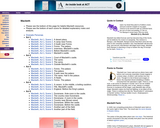
The entirety of Shakespeare's Macbeth is provided in easy to access scene links. There are related resources linked at the bottom as well.
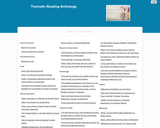
This Composition Reader is an edited, curated collection of OER material for you to use as you see fit in your course. It consists of personal essays, literature, video and audio files, web writing, and long-form journalism.
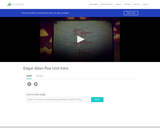
Students will view this slideshow online as the first activity in a blended unit. The activity is meant to introduce the author and some of his works, including several that the students will read as part of the unit. It is primarily intended to spark student interest in the unit. However, it will also aid the students in that they will be better poristioned to read the author's works if they have some sense of what to expect in terms of themes.
The choice to include such as introductory tool into the unit was based upon prior observations regarding the difficulty of getting students engaged in any lesson when nothing had been done to sprak their interest beforehand.
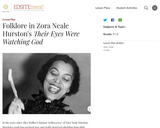
Learn how writer Zora Neale Hurston incorporated and transformed black folklife in her novel Their Eyes Were Watching God. By exploring Hurston's own life history and collection methods, listening to her WPA recordings of folksongs and folktales, and comparing transcribed folk narrative texts with the plot and themes of the novel, students will learn about the crucial role of oral folklore in Hurston's written work.

The object consists of a text in the public domain that has been downloaded from the web, uploaded into the web-based application Kami, and annotated by me with instructions and reflection questions for the students. Students whould read the story while adding their own annotations (such as observations or questions). They may also highlight or underline sections of text and respond to the comments of other students.
The activity is meant to integrate a whole-class read-aloud and an independent active reading of the text, taking the best from both: students will be able to engage in a discussion with their classmates while reading reflecting, and annotating at their own pace.
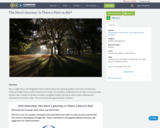
This is a high school unit designed to teach students about the enduring qualities of heroism and how that influences today’s heroes, both in fiction and in reality. Once students understand the concepts, the unit provides teachers with a variety of activities to further strengthen student learning as well as make contemporary connections to the heroic ideal. This unit should take approximately 3-4 weeks.
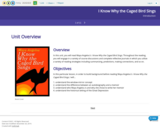
This lesson introduces Maya Angelou's I Know Why the Caged Bird Sings for Storm Lake High School's Diverse Literature course. It gives background on the author, setting, and the book itself as well as introducing students to the window-mirror concept in making connections with literature.
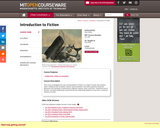
This course investigates the uses and boundaries of fiction in a range of novels and narrative styles--traditional and innovative, western and nonwestern--and raises questions about the pleasures and meanings of verbal texts in different cultures, times, and forms. Toward the end of the term, we will be particularly concerned with the relationship between art and war in a diverse selection of works.
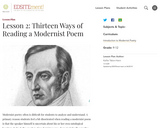
This lesson prompts students to think about a poem's speaker within the larger context of modernist poetry. First, students will review the role of the speaker in two poems of the Romanticism period before focusing on the differences in Wallace Stevens' modernist"Thirteen Ways of Looking at a Blackbird.
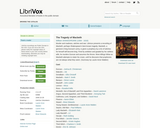
This LibriVox recording is of the entirety of Shakespeare's Macbeth. The recordings are broken up by Act for efficient listening purposes.
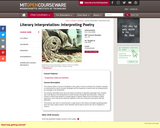
Introduces practice and theory of literary criticism. Seminar focuses on topics such as the history of critical methods and techniques, and the continuity of certain subjects in literary history. Instruction and practice in oral and written communication. Topic: Theory and Use of Figurative Language. This seminar offers a course of readings in lyric poetry. It aims to enhance the student's capacity to understand the nature of poetic language and the enjoyment of poetic texts by treating poems as messages to be deciphered. The seminar will briefly touch upon the history of theories of figurative language since Aristotle and it will attend to the development of those theories during the last thirty years, noting the manner in which they tended to consider figures of speech distinct from normative or literal expression, and it will devote particular attention to the rise of theories that quarrel with this distinction. The seminar also aims to communicate a rough sense of the history of English-speaking poetry since the early modern period. Some attention will be paid as well to the use of metaphor in science.
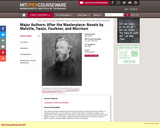
This seminar provides intensive study of exciting texts by four influential American authors. In studying paired works, we can enrich our sense of each author's distinctive methods, get a deeper sense of the development of their careers, and shake up our preconceptions about what makes an author or a work "great." Students will get an opportunity to research an author in depth, as well as making broader comparisons across the syllabus.
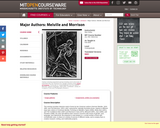
Close study of a limited group of writers. Instruction and practice in oral and written communication. Topic for Fall: Willa Cather. Topic for Spring: Oscar Wilde and the 90s. From Course Home Page: This seminar provides intensive study of texts by two American authors (Herman Melville, 1819-1891, and Toni Morrison, 1931-) who, using lyrical, radically innovative prose, explore in different ways epic notions of American identity. Focusing on Melville's Typee (1846), Moby-Dick (1851), and The Confidence-Man (1857) and Morrison's Sula (1973), Beloved (1987), Jazz (1992), and Paradise (1998), the class will address their common concerns with issues of gender, race, language, and nationhood. Be prepared to read deeply (i.e. a small number of texts with considerable care), to draw on a variety of sources in different media, and to employ them in creative research, writing, and multimedia projects.
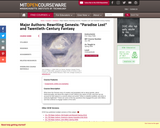
What does the Genesis story of creation and temptation tell us about gender, about heterosexuality, and about the origins of evil? What is the nature of God, and how can we account for that nature in a cosmos where evil exists? When is rebellion justified, and when is authority legitimate? These are some of the key questions that engaged the poet John Milton, and that continue to engage readers of his work.

This is an introductory lesson meant to introduce the issues of slavery and human trafficking, both historical and contemporary, and allow students to begin a research project pertaining to that topic.
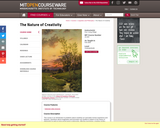
This course is an introduction to problems about creativity as it pervades human experience and behavior. Questions about imagination and innovation are studied in relation to the history of philosophy as well as more recent work in philosophy, affective psychology, cognitive studies, and art theory. Readings and guidance are aligned with the student's focus of interest.